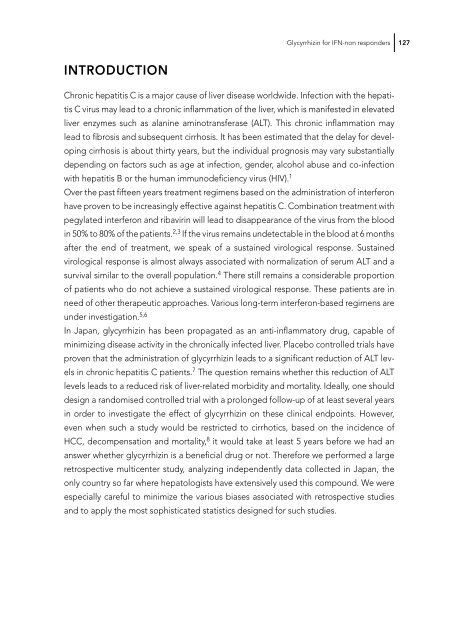View PDF Version - RePub - Erasmus Universiteit Rotterdam
View PDF Version - RePub - Erasmus Universiteit Rotterdam
View PDF Version - RePub - Erasmus Universiteit Rotterdam
Create successful ePaper yourself
Turn your PDF publications into a flip-book with our unique Google optimized e-Paper software.
INTRODUCTION<br />
Glycyrrhizin for IFN-non responders 127<br />
Chronic hepatitis C is a major cause of liver disease worldwide. Infection with the hepatitis<br />
C virus may lead to a chronic infl ammation of the liver, which is manifested in elevated<br />
liver enzymes such as alanine aminotransferase (ALT). This chronic infl ammation may<br />
lead to fi brosis and subsequent cirrhosis. It has been estimated that the delay for developing<br />
cirrhosis is about thirty years, but the individual prognosis may vary substantially<br />
depending on factors such as age at infection, gender, alcohol abuse and co-infection<br />
with hepatitis B or the human immunodefi ciency virus (HIV). 1<br />
Over the past fi fteen years treatment regimens based on the administration of interferon<br />
have proven to be increasingly effective against hepatitis C. Combination treatment with<br />
pegylated interferon and ribavirin will lead to disappearance of the virus from the blood<br />
in 50% to 80% of the patients. 2,3 If the virus remains undetectable in the blood at 6 months<br />
after the end of treatment, we speak of a sustained virological response. Sustained<br />
virological response is almost always associated with normalization of serum ALT and a<br />
survival similar to the overall population. 4 There still remains a considerable proportion<br />
of patients who do not achieve a sustained virological response. These patients are in<br />
need of other therapeutic approaches. Various long-term interferon-based regimens are<br />
under investigation. 5,6<br />
In Japan, glycyrrhizin has been propagated as an anti-infl ammatory drug, capable of<br />
minimizing disease activity in the chronically infected liver. Placebo controlled trials have<br />
proven that the administration of glycyrrhizin leads to a signifi cant reduction of ALT levels<br />
in chronic hepatitis C patients. 7 The question remains whether this reduction of ALT<br />
levels leads to a reduced risk of liver-related morbidity and mortality. Ideally, one should<br />
design a randomised controlled trial with a prolonged follow-up of at least several years<br />
in order to investigate the effect of glycyrrhizin on these clinical endpoints. However,<br />
even when such a study would be restricted to cirrhotics, based on the incidence of<br />
HCC, decompensation and mortality, 8 it would take at least 5 years before we had an<br />
answer whether glycyrrhizin is a benefi cial drug or not. Therefore we performed a large<br />
retrospective multicenter study, analyzing independently data collected in Japan, the<br />
only country so far where hepatologists have extensively used this compound. We were<br />
especially careful to minimize the various biases associated with retrospective studies<br />
and to apply the most sophisticated statistics designed for such studies.

















